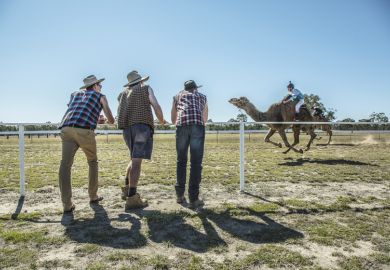A Welsh university has offered compensation to students on a postgraduate health and safety course after an investigation found that they had been taught incorrect and potentially dangerous information.
The University of South Wales upheld a student’s complaint that, if graduates of its master’s in safety, health and environmental management put information that they had been taught by Richard Milligan into practice in the workplace, it “could reasonably be expected to contribute to a fatality (or fatalities) in future”.
The investigation found that Mr Milligan, a lecturer on the safety and business risk modules since 2014, had given “seriously incorrect” advice on issues such as appropriate temperatures to heat cooking oil to, electrical safety, and falling from height. While the review found that it was “very difficult to assess the consequences of following this advice”, it recommended that a review should be conducted into “the implications for health and safety of the information delivered to current and past students”.
The investigation into his lectures from 2016-17 onwards also found a “clear pattern of inaccuracy, inconsistency and error” in teaching on issues such as the safety of fire doors and barbecuing inside.
The probe was launched last year in response to complaints made by students on modules taught by Mr Milligan on the safety MSc and other engineering courses during 2017-18, most of which were upheld. The university has apologised and offered £2,000 compensation to students in recognition of the “distress and inconvenience caused”.
The university offered full refunds for course and accommodation fees for those who did not wish to carry on at USW. Those who wished to stay were offered a review and adjustment of the marks received in Mr Milligan’s classes or the option to repeat the modules, under a different instructor, with the fees covered.
The university was able to check the content of Mr Milligan’s lectures after they were recorded and saved on its virtual learning environment. He was found to have got “very basic scientific information” wrong, including claiming that bleach was an acid, not an alkaline, and that “voltage” was named after the French philosopher Voltaire, not Alessandro Volta.
He suggested that oil could be heated to 360°C – it could catch fire at 250°C – and told students that the “most important thing” they had to do in the workplace was to “keep your job and not be prosecuted”.
The investigation also found that Mr Milligan had given “extremely confusing and inconsistent” information about assessments, compounded by his “reiteration…that he was happy to fail students”. In 2016-17, average marks on modules led by Mr Milligan were more than 20 percentage points lower than on modules led by other tutors.
One of the students told Times Higher Education that what should have been a happy and challenging learning experience was in fact “a ghastly, traumatic experience”.
“I decided on USW because of the advertising which promised an excellent MSc course. Soon after arriving I developed serious concerns about the poor quality and about the lack of veracity of the information we were receiving from Milligan in his lectures,” they said.
Students told THE that they were angry Mr Milligan had been allowed to teach at USW for so long. However, while the investigation accepted that there had been ongoing quality issues with the courses, it said whether the university lacked adequate quality control procedures for lecture content was “more complex”, denied the university had known of his inadequacies before the complaints, and concluded that USW “cannot be held accountable for placing a high degree of trust in the external examiner system”.
The internal investigation did conclude that the content of his 2016-17 lectures was likely to have been of the same quality as the 2017-18 lectures.
Mr Milligan did not respond to a request for comment. According to his LinkedIn profile, he left USW in September and is now retired.
USW said that it “does not comment on individual cases. Any concerns raised by students regarding teaching standards are considered under the appropriate regulations and, if necessary, referred to the team responsible for managing student complaints and concerns,” the university said.
Register to continue
Why register?
- Registration is free and only takes a moment
- Once registered, you can read 3 articles a month
- Sign up for our newsletter
Subscribe
Or subscribe for unlimited access to:
- Unlimited access to news, views, insights & reviews
- Digital editions
- Digital access to THE’s university and college rankings analysis
Already registered or a current subscriber?








